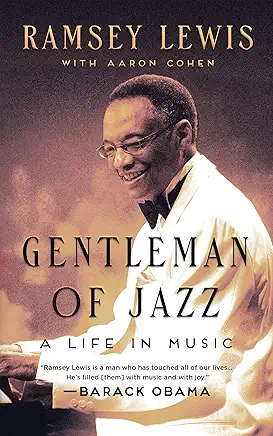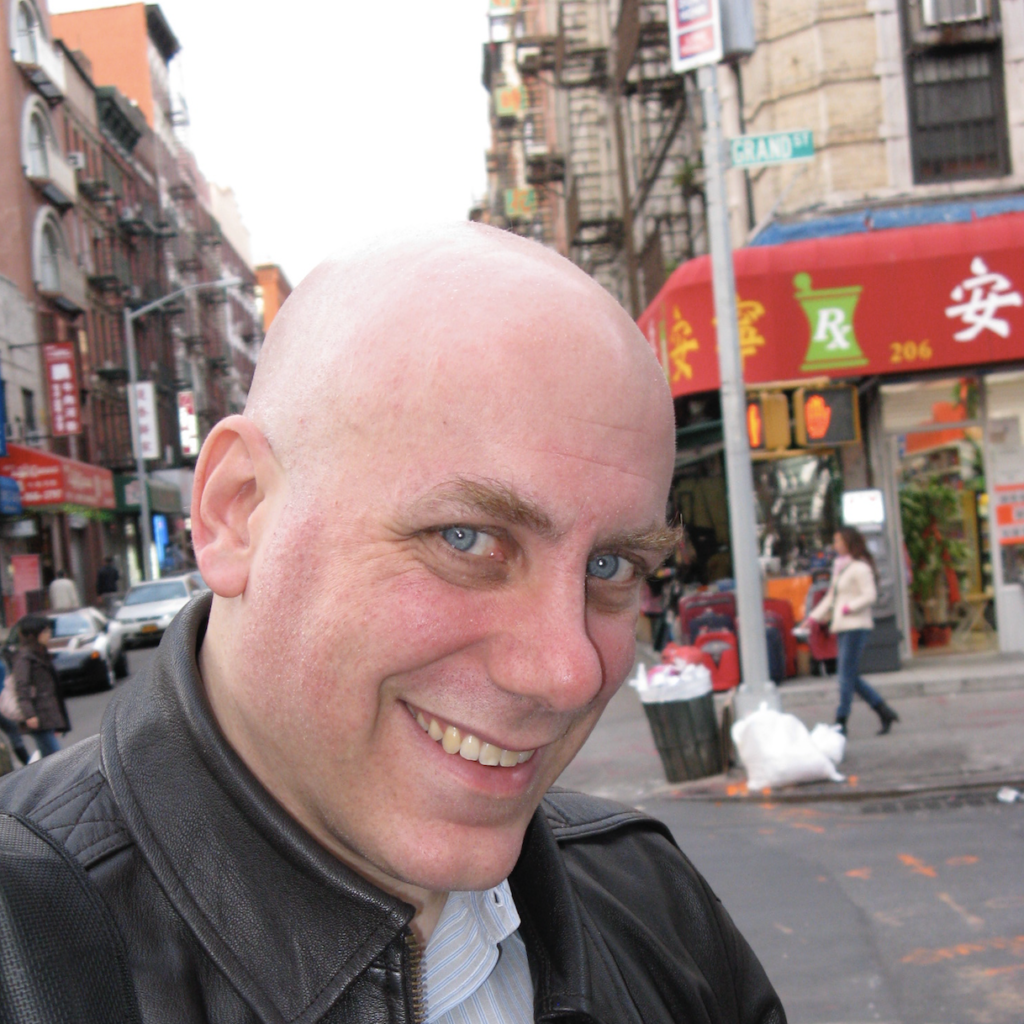
Gentleman of Jazz is the image that reading this book and recalling the original piano trio of the late NEA Jazz Master pianist Ramsey Lewis will most assuredly yield. Essentially an “as told to” autobiography written by Chicago-based music writer Aaron Cohen, this is a revealing read recalling the somewhat underrated odyssey of one of Chicago’s finest and most consistent jazz contributors. And in a book field where jazz greats’ memoirs remain in short supply (plenty of biographies; less so with autobiographies and memoirs), clearly some questions were in order for Aaron Cohen.
What was the genesis of this book project with Ramsey Lewis?
Well, the short answer is Ramsey asked me to co-write the book and I agreed. But there’s a longer, better answer than that. Ramsey had been interested in writing his memoir for a number of years. I can’t say for how long or why he hadn’t actively pursued doing so – though, as we know, being an accomplished musician of his stature is already more than enough work for one lifetime. Meanwhile, I spent the last several years writing about music, editing DownBeat, and completing a couple of books of my own (Amazing Grace and Move On Up: Chicago Soul Music and Black Cultural Power). When Ramsey revisited the idea a few years ago, he and his agent (Brett Steele) asked around for a co-writer and a few people who knew him and knew my work recommended me. So Brett called and I sent him samples of my work.
Then Ramsey called and invited me to his home downtown to meet him and his wife Jan and talk about the project. So I wrote an outline for what I felt should be covered in the book and what we should start with for a sample chapter. (I thought it would be the events preceding and after [Ramsey’s all-time hit] “The In Crowd” because it was the hit that changed everything). We agreed on all of that and after we completed the chapter, Brett sent it off to potential publishers and Blackstone picked it up. And then the work really started. Funny thing, I had spoken briefly to Ramsey a couple of times before this – we met in 1998 on our way to the Havana International Jazz Festival (him as a performer, me as a journalist) and chatted when I was in the audience for a taping of one of his TV shows. But I had never interviewed him for an article. Reason being that wherever I worked, it was always someone higher in the pecking order who got to interview him.
Talk a bit about your research and where you were able to derive valuable insights and information into Ramsey Lewis’ artistry.
Most of the insights came from Ramsey himself. But I did a lot of other research through back issues of jazz magazines (especially DownBeat) as well as periodicals that may not have been considered music magazines per se, be they newspapers like the Chicago Tribune and New York Times, or African American periodicals, including the Chicago Defender and Ebony. All of which not only described his music but also a lot of his earlier charitable work that he was too humble to brag about. I also have to add that the brilliant scholar Guthrie Ramsey, Jr. has helped illuminate many of my thoughts on Ramsey’s work. There were also great books about wider issues surrounding Ramsey’s trajectory, such as Isabel Wlkerson’s The Warmth Of Other Suns about the Great Migration. Ramsey also enjoyed that book and we discussed it during one of our conversations. Along with books and articles, one of the joys of working on this project was playing Ramsey YouTube videos of himself in the early 1970s and watching his reaction. Not only did it open up Ramsey’s memories of the time, but the look of elation as he watched his younger self was priceless. One post-script: I am looking forward to reading Mike Smith’s new book In With The In Crowd: Popular Jazz in 1960s Black America, which seems to be about topics that Ramsey and I discussed.

Aaron Cohen
Who were some of the most informative interviewees for this book beyond your many conversations with Ramsey, and why did you feel a need to incorporate their “voices” in this book?
From the outset, Ramsey and I both felt it was important to add other perspectives to make his story multi-dimensional. And to Ramsey’s credit, he did not change the perspectives of former colleagues who remembered things differently than he did. That was especially the case when Redd Holt added his thoughts on why the original Ramsey Lewis Trio broke up. Also, not only were so many of his former colleagues also great musicians but so many of them have been incredible characters, too. One of my favorites was percussionist Derf Reklaw, who I spoke to about three weeks before he passed. A wonderful guy, Derf was also a zany character who provided a rich contrast to Ramsey who was more straight-laced (though Ramsey also always had a sharp sense of humor).
Ramsey’s family also provided many perspectives when he spoke about some delicate issues that had to be part of the narrative. But everyone I included had very valuable things to say and I’m incredibly grateful for everything they shared for this project. It’s interesting, one other jazz memoir that included many perspectives of others was Art Pepper‘s The Straight Life and while he was a great saxophonist, I can’t think of two more dissimilar personalities than Ramsey Lewis and Art Pepper.
Would this book be appropriately placed in the category of an “as-told-to” autobiography?
Indeed, it is an as-told-to biography. Ramsey enjoyed reading the chapters as they were completed and commented on them, and it is heartbreaking that he did not live long enough to see it published. He passed before the introduction was written, so I wrote that while including his quotes that would have been used for that part. I also felt that I should add an annotated discography. As I was working on the book, many people asked me which of his 60 albums they should buy. So rather than just list them all and leave it at that, I decided to add my thoughts on about 20 or so that I felt should be in everybody’s home.
As you researched Ramsey Lewis life and career, what most compelled you to write this book?
I’ve always loved Ramsey’s music – growing up a jazz and soul fan in Chicago, how could I not? It’s always fascinated me how he could take from so many idioms – jazz, soul, gospel, classical – and come up with something that only he could do. But working on the book enlightened me as to what an incredible life’s journey he led. From talking about his parents’ struggle to his own deep love for music, to how his hard work and open mind led to incredible success – it adds up tp a great story of African American accomplishment that the world needs to hear. Also, as I mentioned earlier, he had such a great sense of humor, it was a joy spending time with him and I hope that joy translated to the printed page.
Given that there are obviously writers and would-be writers out here who might be contemplating or working towards a similar project with a great artist, please detail your process in working with Ramsey.
Ramsey and I met at his place about once a week, or we’d talk over Zoom. Meanwhile, I would also conduct interviews (mostly over the phone) with people who worked with him as well as his family members. Either I would transcribe the interviews or if it was a busy week of other duties, I’d pay to have a few transcribed. (Along with working on the book, I was juggling responsibilities as a community college professor and freelance journalist). I would also research questions using the media I mentioned above before speaking with him, and to verify dates and such, after speaking with him, I could not expect him to remember activities or performances from decades earlier – I can’t even remember what I had for lunch yesterday – so I would bring him articles and play clips to jog his memory and get his response. Ideally, we would have also been able to just hang out and talk without it being for the book, but sadly, our time was limited.
What has been the response to this book thus far, and where do you hope to go with it?
The response I was most concerned about was from Ramsey while we were working on it, as well as Jan and his family after it was published, as well as his former colleagues and people who knew him. They all approved of it. The best public event for the book was in downtown Chicago last summer. Jazz radio hero Mark Ruffin hosted a wonderful panel discussion at the Chicago Cultural Center, followed by a terrific concert of Ramsey’s music that trumpeter Orbert Davis put together in Millennium Park. The book also received some very nice reviews and I’m glad that those articles continue to let people know what a great musician Ramsey was. I hope the book stays in print forever and it continues to illuminate people what an incredible life Ramsey lived. Meanwhile, I’m using this experience to help guide my current book project, which is I’m helping finish the memoir of another NEA Jazz Master, Richard Davis. I’ve enjoyed giving talks about Ramsey and Richard and the qualities they shared, as well as what made their own music so distinctive.
